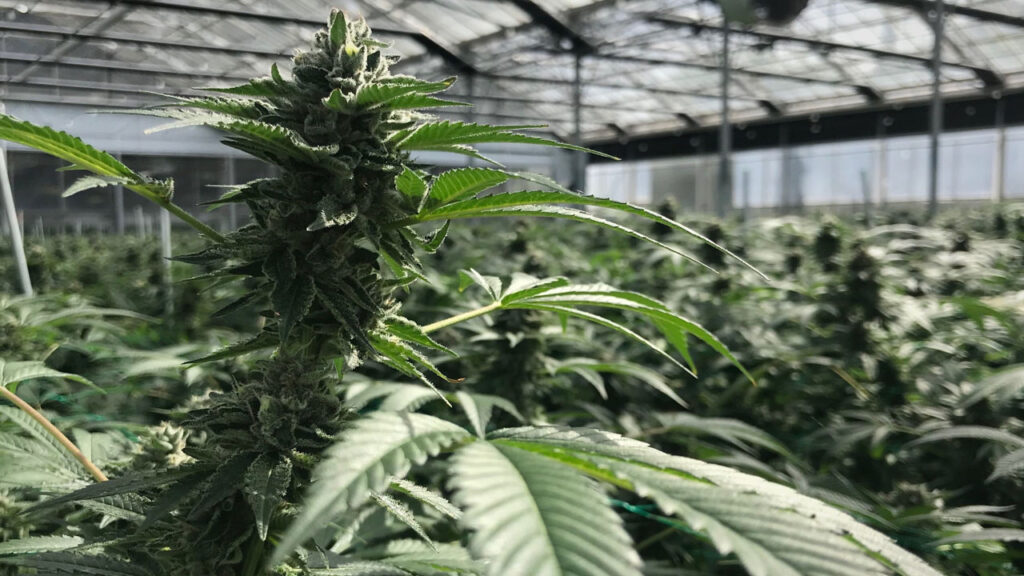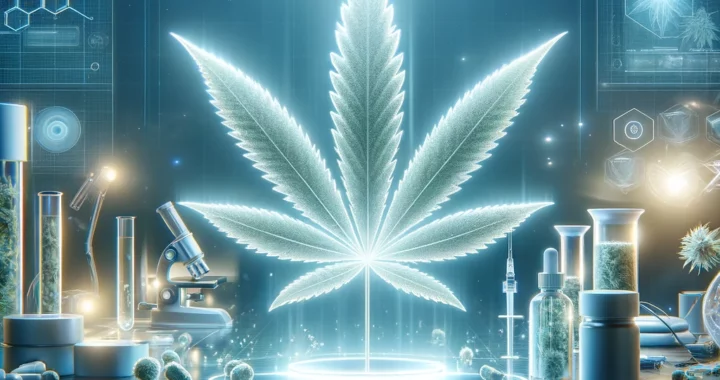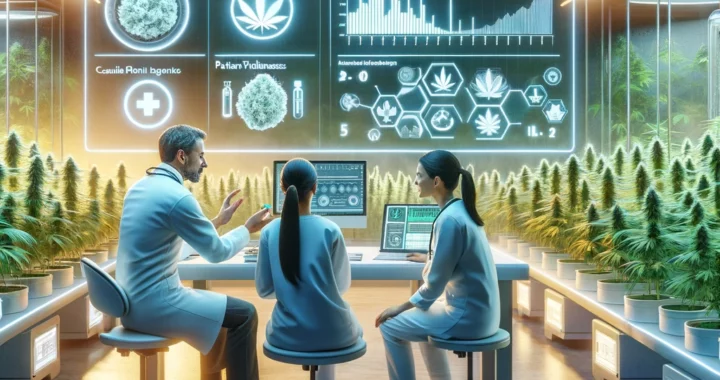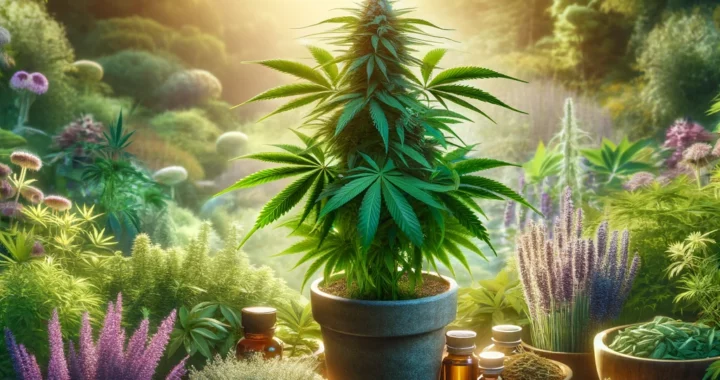Fresh debate rages over regulation of medical Cannabis in Nigeria | The Guardian Nigeria News
19 min read
A cannabis farm. Photo: NPR
The recent decision by the National Drug Law Enforcement Agency (NDLEA) to go after supermarkets, confectionary stores and others dispensing Cannabis cookies has raised the debate whether medicinal values of Cannabis cannot be isolated from the harmful effects.
The clampdown on Cannabis sativa, also known as Indian hemp and marijuana by NDLEA, has been a long drawn battle over the years. But of late, many countries have adopted the healthy side of Cannabis in treatment of various chronic diseases. The weed grows luxuriously in the country, in parts of Ondo, Edo and Delta states.
Ondo State governor, Rotimi Akeredolu, had, in May 2019, disclosed plans by the state government to grow marijuana, also known as Indian hemp or cannabis, for medicinal and economic reasons.
The governor, on Monday, May 13, 2019, was in Thailand with the former head of NDLEA, Muhammad Abdallah, for a programme on medicinal cannabis extract development.
The governor said Nigeria would be shortchanging itself by not tapping into the economic value of marijuana, a banned substance in the country.
He said the enterprise, under the supervision of the NDLEA, would create thousands of jobs for Nigerians if seriously considered by the Federal government.
He said: “We all know that Ondo State is the hot bed of cannabis cultivation in Nigeria. We know how to grow it and it thrives well in the Sunshine State. With an estimated value of $145 billion in 2025, we would be shortchanging ourselves if we fail to tap into the legal marijuana market.
“Our focus now is Medical Marijuana cultivation in controlled plantations under the full supervision of the NDLEA. I strongly implore the Federal Government to take this seriously as it is a thriving industry that will create thousands of jobs for our youth and spur economic diversification.”
The programme centred around building capacity and researching the modality of licensing for planting and extracting cannabis oil in Nigeria as well as exploiting its commercial potential with focus on Ondo State.
Little wonder some doctors especially oncologists in Nigeria, United States (U.S.), United Kingdom (U.K.), Canada among other countries recommend it for their patients.
Even Coca-Cola is considering developing a drink containing Cannabis. Coca-Cola had said it was eyeing the cannabis drinks market.
Coca-Cola said it was monitoring the nascent industry and is interested in drinks infused with cannabidiol, or CBD- the non-psychoactive ingredient in marijuana that treats pain but does not get one high.
Some doctors in Lagos, who preferred anonymity told The Guardian they prescribe decoction of Cannabis for cancer patients.
The situation has raised questions on limits of law and advancement in medicine and why all of Indian hemp may not be bad and which aspect of it is helpful and what regulations can do to broker middle ground.
A consultant psychiatrist and coordinator, Lagos University Teaching Hospital (LUTH) Suicide Research and Prevention Initiative (SURPIN), Dr. Raphael Emeka Ogbolu, told The Guardian: “The debate around cannabis has been on for a long time. Cannabis is illegal in Nigeria and there are reasons why it should be. There is no doubt some scientific evidence that medicinal cannabis (not regular street cannabis) has some benefits in treating terminally ill patients with cancer and some other chronic painful conditions. However, there is abundant evidence that cannabis (marijuana, Indian Hemp, etc.) is harmful to the brain especially the young developing brain. It has a strong association with psychosis and has been reported to bring forward the age of onset of psychotic illnesses.
“Some people smoke it to self-medicate saying it helps them keep calm and focus but there are many chemical components in the cannabis plant that have unknown effects and many are hallucinogenic. For these reasons, many mental health experts advise against it. It is worse for those who have other factors that predispose them to mental illness, which they may be unaware of.
Buhari. Photo: TWITTER/NIGERIAGOV
“People who promote it sell all types of information and myths such as that it is a healthy plant, that it is in the scriptures just to make it seem acceptable to the youths. In my personal experience, for years working in psychiatry, there was a period of at least five years where I noted that there was at least one patient admitted due to cannabis related psychosis every month. That is huge and enough evidence for me to err on the side of caution and join the voices against it.
“The use of medicinal cannabis on the other hand, needs more local research to evaluate its use in Nigeria and if it is to be encouraged, it needs very strict regulations. This requires discussions between the experts and the control agencies.”
Medical Director, Optimal Specialist Hospital, Surulere, Lagos, Dr. Celestine Ugochukwu Chukwunenye, told The Guardian: “Indian hemp or Cannabis sativa has a long history of being controversial because it is a source of an addictive substance called Tetrahydrocannabinol (THC), despite its many medicinal and non medicinal uses. Traditionally, Indians used the dry plant stem to make mats, bags, nets, cords or ropes etc. The latex from stem they used to make rubber. The leaves are rich in essential fatty acids, proteins, and micronutrient minerals that are beneficial to human health. The dried roots act as a stimulant for the heart.
“There are various strains of hemp. The type that is grown legally in many countries for industrial hemp has low content of the addictive substance THC. This low THC containing strain has turned to a multi billion dollar business worldwide. It is used in medicine as a pain killer of the last resort, to control nausea in cancer patients, and those on radiation treatment. It is also used as an appetite suppressant.”
Chukwunenye, who is a consultant Obstetrician and Gynaecologist, said with appropriate legislation and careful control, it could become a significant contributor to Nigeria’s National Gross Domestic Product (GDP), just like cigarettes and alcohol consumption. He, however, said it is difficult to justify its production in today’s Nigeria where there is a virtual breakdown of societal norms and unmitigated violence on a daily basis. “The potential for compromise of the officers that will be assigned this regulatory responsibility is extremely high,” the gynaecologist said.
The physician added: “Cannabis sativa in the processed form is already in use in our hospitals but to allow it in the raw form is what is under debate. But with current legislation against the use of the raw forms, it is common knowledge that it is widely used underground. It may therefore, be better if the current legislation is amended to allow its limited but regulated use for medicinal and non medicinal purposes, as discussed above.
“The best thing to do now is to save our society and country from the precipice and anarchy through introduction of better governance systems at all levels.”
A professor of Botany, Department of Botany, University of Lagos, Dele Olowokudejo, said: “Quite an interesting situation. You know that in those countries where it is legalised because of the obvious medicinal and therapeutic benefits, there were legislations and strict regulations pertaining to its distribution, sale, possession and use….including certification.
“Therefore we need to go that route before it can be made available and easily accessible. Otherwise there will be chaos.”
Public health specialist, consultant clinical pharmacist and Chairman, Association of Hospital and Administrative Pharmacists of Nigeria (AHAPN), Dr. Kingsley Chiedu Amibor, said: “Cannabis is also known as Marijuana, it has over 500 active ingredients known as cannabinoids, with two showing the greatest potential for medicinal use. Tetrahydrocannabinol (THC) is responsible for the psychoactive effects experienced with the use of the plant, while Cannabidiol (CBD) is purely medicinal and has no effect on the mind and behavior. THC increases appetite and reduces nausea and thus can be highly effective for cancer patients undergoing chemotherapy since it would obviate the need for them to use routine drugs for nausea, which are accompanied by numerous side effects as compared to cannabis.
“CBD is very useful in reducing pain and inflammation. Cannabis is very effective for chronic pain, which is a leading cause of disability. It contains cannabinoids that act on the same receptors in the brain as opioids pain medicines, and in the process relieves moderate to severe chronic pain. Cannabis has the advantage of having almost no side effects as compared with the side effects of liver damage from prolonged paracetamol use, respiratory problems, stomach ulcers arising from use of non-steroidal anti- inflammatory drugs (NSAIDS) and several others. Combinations of THC and CBD have been successfully used to control epileptic seizures and, in some cases, kill cancer cells.”
Amibor said medical cannabis is commonly used for severe or long-term pain, nausea and vomiting due to chemotherapy (cancer treatments), and painful muscle spasms. He said other medical conditions for which patients can use medical cannabis include glaucoma, Human Immuno-deficiency Virus (HIV)/ Acquired Immune Deficiency Syndrome (AIDS), Huntington’s disease, Inflammatory bowel disease and multiple sclerosis. According to the pharmacists, others are neuropathy, Parkinsons disease, post traumatic stress disorder and seizures (epilepsy) and it can also be used in severe pain, severe nausea, spinal cord injury with spasticity and muscle atrophy.
He said studies have found that cannabis seed extract has antioxidant effects owing to its cannabidiol content, which regulates the immune system and could help in neurological conditions such as Parkinson’s disease, multiple sclerosis, neuropathic pain, Alzheimer’s disease and so on. “Cannabis possesses strong anti-inflammatory properties. It is therefore highly useful in relieving pain resulting from an injury, infection or any autoimmunity disorder,” Amibor said.
Amibor said: “Atopic dermatitis and acne can both result from chronic inflammation, which could result from a deficiency in omega-3. Cannabis is a rich source of plant fiber and omega-3 fatty acid and along with some vitamins and minerals all help to keep the skin moisturised, soft, supple and disease-free. Cannabis seeds provide essential amino acids, which are used as building blocks for repair and regeneration across the body. Cannabinoids present in Cannabis seed oil have anti- rheumatic effects. Cannabis has high iron content which can be helpful in treating anaemia.”
The pharmacist said medical cannabis is a multi-dollar industry worldwide and in the United States (U.S.), it is estimated that legal cannabis or marijuana could fetch the country close to $80 billion by the end of 2022.
He said legalisation of cannabis for medical purposes in Nigeria has its own challenges. “For one, Nigeria has demonstrated poor leadership in the area of enforcement of policies and laws. There is poor monitoring and evaluation and even tracking of citizens in the event something goes wrong. It is not advisable to legalise the plant for routine consumption in Nigeria,” Amibor said.
The pharmacist said the use of medical cannabis in Nigeria is advocated as a tightly controlled prescription medication as is the case with morphine and pethidine and in which case, it should be made available only to terminally ill patients and only in approved medical centres.
Osagie Ehanire
Amibor, however, said in Nigeria, it is an offence to manufacture, sell, possess, import, export or otherwise deal in cannabinoid drugs including cannabis without an appropriate license. He said the regulatory agencies in Nigeria with jurisdiction over cannabinoid drugs are: the National Drug Law Enforcement Agency (NDLEA), National Agency for Food, Drug Administration and Control (NAFDAC), the Federal High Court and the Federal Ministry of Health. The Minister of Health of Nigeria regulates the importation, possession, supply, distribution and use of cannabinoids under the Dangerous Drugs Act and Regulations.
The pharmacists said in Nigeria, there is no list of approved cannabinoid drugs. He said the Indian Hemp Act defines Indian Hemp to include “any plant or part of a plant of the genus cannabis.” Amibor said the Act prohibits the planting, cultivation, importation, exportation and use of Indian Hemp in Nigeria, subject to the provisions of the Dangerous Drugs Act. He said the Act authorises medicinal cannabis in Nigeria subject to some laid down conditions.
Amibor said there is need to strengthen the NDLEA and NAFDAC to enable them execute their regulatory activities with regards to use of Cannabis in Nigeria. He said much as there is need for medical use of Cannabis, strict controls need to be put in place to ensure that the substance is not abused. “There is need to ensure prescriptions for Cannabis are authenticated and coming from the right sources. Physicians prescribing cannabis for patients must ensure that standard treatment guidelines are strictly adhered to. In the same vein, pharmacists that make the substance available in Pharmacies must ensure that appropriate dispensing and documentation procedures are strictly followed. They must insist on seeing authentic prescriptions duly signed with the name and signature of the prescribing physician before a refill is processed for the patient,” he said.
The hospital pharmacist said all prescriptions for Cannabis filled by duly registered and licensed pharmacists must be stored in a safe place and be made available for inspection by regulatory officials from NDLEA, NAFDAC and officials of the Federal Ministry of Health officials from time to time. “Electronic recording (e-recording) of cannabis use in hospitals is recommended to guard against destruction or misplacement of manual records,” he said.
Amibor added: “Cannabis is a drug of abuse, causes dependence and is addictive like other substances of abuse. Hence regular control measures must be put in place to ensure that abuse of medical cannabis even by health care workers is obviated. Documentation efforts should include names of suppliers of such substance, address or location, quantities supplied and dates of supply.
There is need to review some of the laws on illegal use of cannabis in Nigeria. Some of the current laws may not serve as enough deterrent to offenders. Fines may need to be reviewed upwards to discourage abusers.
“Discipline among regulatory officials is highly important if they are to succeed in discharging their regulatory functions. Cases of corruption among such officials must not be encouraged. Interventions to improve efficiency of regulatory officials such as in-service training and re-orientation courses should be put in place. Remuneration of such workers should be reviewed upwards from time to time, with hazard allowance being paid to them, bearing in mind the hazardous nature of their assignments. Reorientation courses for officials is necessary to prevent them from colluding with people who are involved with illegal use of the substance.”
Amibor said with regards to calls for mass local growth of Cannabis plant in Nigeria as was advocated recently by a state governor in Nigeria as a revenue earner, one needs to be wary of the fact that this is a substance of abuse, and as such, control measures must be put in place to guard against abuse even at the point of cultivation. “Don’t forget that even parts of the plant are being abused. Government should not at this stage be preoccupied with monetary gains from commercialisation of cannabis, but the health implications of Cannabis abuse must be seen to be the overriding consideration,” he said.
The pharmacist further explained: “This becomes important when you consider adverse effects of cannabis abuse. Currently, Cannabis is the most commonly used illicit drug in Nigeria, with particularly high rates of use among young people. The regular use of cannabis during adolescence is particularly of concern, because of increased risk of deleterious consequences in that age group.”
Amibor said available evidence shows that long term use of cannabis can lead to addiction and about nine per cent of those who experiment with Cannabis will become addicted, with the number increasing to 25 to 50 per cent among those who smoke cannabis illegally daily. He said withdrawal syndrome accompanies cannabis use, which include irritability, sleeping difficulties, dysphoria, craving and anxiety, which makes it difficult to stop and contributes to relapse. The pharmacist said regular use of cannabis is associated with an increased risk of anxiety and depression. “It is also linked with psychosis including those associated with schizophrenia. The need for strict monitoring of cannabis used in medical conditions described above cannot be overemphasized to avoid dependence and addiction on the long run,” he said.
Meanwhile, earlier advice published in DailyMailOnline revealed cannabis can kill cancer cells and shrink one of the most serious types of brain tumours.
The National Institute on Drug Abuse in the United States (US) has admitted, in its revised publication on marijuana, that the drug offers benefits to some cancer patients.
Amibor
The report stated: “Recent animal studies have shown that marijuana extracts may help kill certain cancer cells and reduce the size of others.
“Evidence from one animal study suggests that extracts from whole-plant marijuana can slow the growth of cancer cells from one of the most serious types of brain tumours.
“Research in mice showed that these extracts, when used with radiation, increased the cancer-killing effects of the radiation.”
Previous studies indicate that cannabis, Indian Hemp or rather marijuana may provide the novel treatment for prostate cancer by acting as analgesia on bone pain, improving quality of life, while reducing narcotic consumption and preventing opioid dependence.
Besides its use in the treatment of diseases and health problems such as Human Immuno-deficiency Virus (HIV)/Acquired Immune Deficiency Syndrome (AIDS), glaucoma, eye problems, cachexia (wasting syndrome), pain, muscle spasticity, convulsion, insomnia, asthma, hypertension, depression, among others; Cannabis sativa has been confirmed to be effective in managing prostate cancer patients.
Researchers in a study published in Indian Journal of Urology concluded: “It is our conclusion that it would be of interest to conduct clinical trials involving medicinal cannabis or other cannabinoid agonists, comparing clinical markers such as Prostate Specific Antigen (PSA) with controls, especially in men with bone metastatic prostate cancer, whom would not only benefit from the possible anti-androgenic effects of cannabinoids but also from analgesia of bone pain, improving quality of life, while reducing narcotic consumption and preventing opioid dependence.”
Cannabinoids are present in Cannabis sativa and occur naturally in the nervous and immune systems of animals. They are structurally related to tetrahydrocannabinol (THC) or that bind to cannabinoid receptors.
PSA is screening test for prostate cancer.
An opioid is any psychoactive chemical that resembles morphine in its pharmacological effects.
The study, titled: “The role of cannabinoids in prostate cancer: Basic science perspective and potential clinical applications” was published by Juan A. Ramos and Fernando J. Bianco.
The term medicinal marijuana refers to using the whole unprocessed plant or its basic extracts to treat a disease or symptom.
Currently, the drug is not recognised by the National Agency for Food and Drug Administration and Control (NAFDAC) and the US Food and Drug Administration (FDA) as a medicine.
However, studies of the chemicals in marijuana – cannabinoids – has led the FDA to approve two medications that contain cannabinoid chemicals.
Currently two cannabinoids, of around 100, are of medical interest – THC and CBD.
THC increases appetite and reduces nausea. It may also decrease pain, inflammation and muscle control problems.
It is thought to be useful in minimising pain and inflammation, controlling epileptic seizures and possibly treating mental illness and addictions.
In the United Kingdom (UK), THC is the active ingredient in the prescribed drug Sativex.
It is currently only licensed to treat and relive the pain of muscle spasms in Multiple Sclerosis (MS) patients.
Scientists are also conducting clinical trials and preclinical studies into the effects of marijuana on: Autoimmune diseases, including Human Immuno-deficiency Virus (HIV) and Acquired Immune Deficiency Syndrome (AIDS), multiple sclerosis and Alzheimer’s disease; inflammation; pain; seizures; substance use disorders; and mental disorders.
Also, Nigerian researchers from Adekunle Ajasin University, Akungba –Akoko, Ondo State, in study published in IOSR Journal of Pharmacy Vol. 2, Issue 3, May-June, 2012, pp.460-463 concluded: “Cannabis sativa is a wonderful and sacred plant that is grown all over the world. It is a plant, which is plagued, ignorantly, with suspicions and controversies that greatly prevented its usefulness to mankind.
“Apart from being used for recreational purposes, Cannabis sativa is useful for the treatment of some chronic diseases which defied medical cure such as HIV/ AIDS, cancer, asthma etc. Marijuana is also a plant that has some commercial and economical value.
“Consequent upon these values, it is recommended that: Cannabis sativa should be legalised so that it can provide employment for the producers, distributors and traders of the commodity. More researches should be carried out on Cannabis Sativa so that mankind could harness the medical, commercial, agricultural, social, recreational and economic utility inherent in the crop.”
Meanwhile, it has been hailed as a wonder drug and it’s certainly creating wonder profits. By some estimates, the Cannabidiol (or CBD) market could be worth $20 billion dollars by 2024. While users tout its effectiveness in pain relief, up until now there has been limited experimental human research on the actual effectiveness of the drug.
However, a new study led by researchers at Syracuse University sheds light on the ability of CBD to reduce pain along with the impact that the so-called placebo effect may have on pain outcomes.
The study titled “The effects of cannabidiol and analgesic expectancies on experimental pain reactivity in healthy adults: A balanced placebo design trial” was published in the journal Experimental and Clinical Psychopharmacology.
A researcher in the psychology department at Syracuse University’s College of Arts and Sciences, New York, United States, Martin De Vita, said: “For science and the public at large the question remained, is the pain relief that CBD users claim to experience due to pharmacological effects or placebo effects. That is a fair question because we know that simply telling someone that a substance has the ability to relieve their pain can actually cause robust changes in their pain sensitivity. These are called expectancy effects.”
De Vita, along with Syracuse Emeritus Psychology Professor Stephen Maisto, were uniquely prepared to answer that exact question. The pair, along with fellow lab member and doctoral candidate Dezarie Moskal, previously conducted the first systematic review and meta-analysis of experimental research examining the effects cannabinoid drugs on pain. As the first experimental pain trial to examine CBD, their study yielded consistent and noteworthy results. Among other findings, the data showed that CBD and expectancies for receiving CBD do not appear to reduce experimental pain intensity, but do make the pain feel less unpleasant.
De Vita and Maisto used sophisticated equipment that safely induces experimental heat pain, allowing them to measure how the recipient’s nervous system reacts and responds to it. “Then we administer a drug, like pure CBD, or a placebo and then re-assess their pain responses and see how they change based on which substance was administered,” said De Vita.
Researchers then took it a step farther by manipulating the information given to participants about which substances they received. In some cases, participants were told that they got CBD when they actually received a placebo, or told they would be getting a placebo when they actually got CBD. “That way we could parse out whether it was the drug that relieved the pain, or whether it was the expectation that they had received the drug that reduced their pain,” according to De Vita. “We hypothesized that we would primarily detect expectancy-induced placebo analgesia (pain relief). What we found though after measuring several different pain outcomes is that it’s actually a little bit of both. That is, we found improvements in pain measures caused by the pharmacological effects of CBD and the psychological effects of just expecting that they had gotten CBD. It was pretty remarkable and surprising.”
“The data is exciting but pretty complex in that different pain measures responded differently to the drug effect, to the expectancy, or both the drug and expectancy combined—so we’re still trying to figure out what is behind the differential data with different kinds of pain measures,” said Maisto. “The next step is studying the mechanisms underlying these findings and figuring out why giving instructions or CBD itself causes certain reactions to a pain stimulus.”
Most people think of pain as an on and off switch, you either have it or you don’t. But pain, as De Vita describes it, is a complex phenomenon with several dimensions influenced by psychological and biological factors. For example, whereas pain intensity reflects a “sensory” dimension of pain, unpleasantness represents an “affective,” or emotional, aspect of pain. “If you think of pain as the noxious noise coming from a radio the volume can represent the intensity of the pain, while the station can represent the quality,” said De Vita.
Results from his previous study showed that while cannabinoid drugs weren’t reducing the volume of pain, they were “changing the channel making it a little less unpleasant.” According to De Vita, “It’s not sunshine and rainbows pleasant, but something slightly less bothersome. We replicated that in this study and found that CBD and expectancies didn’t significantly reduce the volume of the pain, but they did make it less unpleasant—it didn’t bother them as much.” As part of the study De Vita and Maisto developed advanced experimental pain measurement protocols “to pop the hood and start looking at some of these other mechanistic pain processes,” said De Vita. “It’s not just pain, yes or no, but there are these other dimensions of pain, and it would be interesting to see which ones are being targeted. We found that sometimes, pharmacological effects of CBD brought down some of those, but the expectancies did not. Sometimes they both did it. Sometimes it was just the expectancy. And so, we were going into this thinking we were going to primarily detect the expectancy-induced pain relief but what we found out was way more complex than that and that’s exciting.”
One important note to also consider is the source of the CBD. “What we used in our study was pure CBD isolate oil,” said De Vita. “Commercially available CBD products differ in their content and purity, so results might be different for different CBD products, depending on what other compounds they may or may not contain.”
Meanwhile, researchers who surveyed a population-based sample of medical oncologists said while a wide majority of oncologists do not feel informed enough about medical marijuana’s utility to make clinical recommendations, most do in fact conduct discussions on medical marijuana in the clinic and nearly half recommend it to their patients.
The study, published in the Journal of Clinical Oncology, is the first nationally representative survey of medical oncologists to examine attitudes, knowledge and practices regarding the agent since medical marijuana became legal on the state level in the US.
Of note, additional findings of the current study suggest that nearly two-thirds of oncologists believe medical marijuana to be an effective adjunct to standard pain treatment, and equally or more effective than the standard therapies for symptoms like nausea or lack of appetite, common side effects of cancer treatments such as chemotherapy.
Medical marijuana refers to the non-pharmaceutical cannabis products that healthcare providers recommend for therapeutic purposes.
A significant proportion of medical marijuana products are whole-plant marijuana, which contains hundreds of active ingredients with complicated synergistic and inhibitory interactions.
By contrast, cannabinoid pharmaceuticals, which are available with a prescription through a pharmacy, contain no more than a couple of active ingredients.








 Protected by Patchstack
Protected by Patchstack